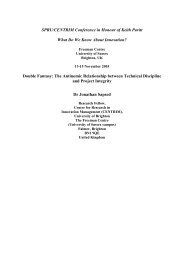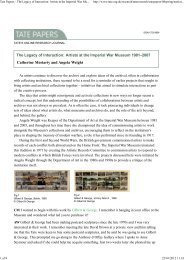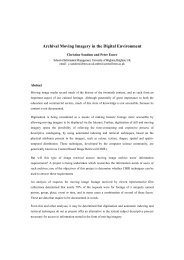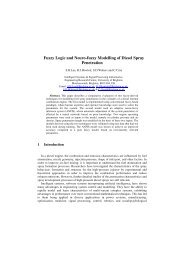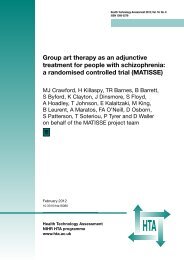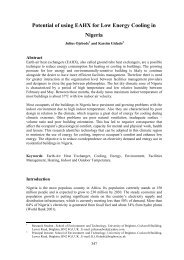NESTA Crime Online - University of Brighton Repository
NESTA Crime Online - University of Brighton Repository
NESTA Crime Online - University of Brighton Repository
You also want an ePaper? Increase the reach of your titles
YUMPU automatically turns print PDFs into web optimized ePapers that Google loves.
particularly good one, since constant reports <strong>of</strong> breaches have the potential to<br />
desensitise the public to data losses. 238 However, the European Commission – as well as<br />
many interviewees – consider that such a regulation would create an incentive to invest<br />
in security (EC, 2006).<br />
UK Government departments are the only bodies required to notify the information<br />
commissioner <strong>of</strong> any potential data losses. This requirement does not apply to private<br />
business, so the extent <strong>of</strong> the problem remains largely unknown. In the absence <strong>of</strong><br />
legislation, the commissioner has produced guidance for businesses on when it should<br />
be notified <strong>of</strong> data breaches as a matter <strong>of</strong> good practice.<br />
But one event on the horizon makes action imperative. The 2012 Olympic Games in<br />
London raise serious issues and challenges in relation to cybercrime. Cybercriminals<br />
have in the past exploited high-pr<strong>of</strong>ile events either for financial gains or to lure<br />
unsuspecting web users into downloading malicious code. The experience from previous<br />
Olympics tells us that the number and scale <strong>of</strong> cyber attacks increase at each event. The<br />
Sydney Olympics lost £500 million in contract fraud. The winter Olympics in Turin 2006<br />
had four million attacks per day (though only 49 required immediate action). 239 In<br />
Beijing 2008 the number <strong>of</strong> attacks rose to about 12 million security alerts per day, with<br />
alarms triggered on more than 12,000 devices spread over 70 venues. 240<br />
The London 2012 Games have been tagged as the first ‘digital Olympics’ by one <strong>of</strong> our<br />
interviewees. Digital technologies will be an integral part <strong>of</strong> the ticketing, billing,<br />
broadcasting and transport systems. The IT infrastructure for London Olympics<br />
supersedes the complexity <strong>of</strong> any previous Games – about 900 servers, 1,000 network<br />
security devices and 8,000 computers will be provided. 241 Video streams, real-time<br />
Games updates and live travel information will be accessible from mobile devices.<br />
Blogging and social networking are also intended for interaction between athletes,<br />
238 Data Sharing Review Annex Report, Ministry <strong>of</strong> Justice, 2008.<br />
239 Interview with Michael Hallowes, National Policing Improvement Agency (NPIA), 2 nd April 2009. It is,<br />
however, recognised that such aggregated data makes no differentiation between a deliberate external attack<br />
from an unauthorised use <strong>of</strong> a USB port to re-charge a mobile phone.<br />
240 Nick Heath (2008), “Protecting the Beijing Olympics from hackers. How IT experts kept the Games on<br />
track”, Silicom.com, 30 th October 2008.<br />
241 Nick Heath (2009): “Olympics IT gets lean, mean and green”, Silicom.com, 5 th March 2009.<br />
Page 85




